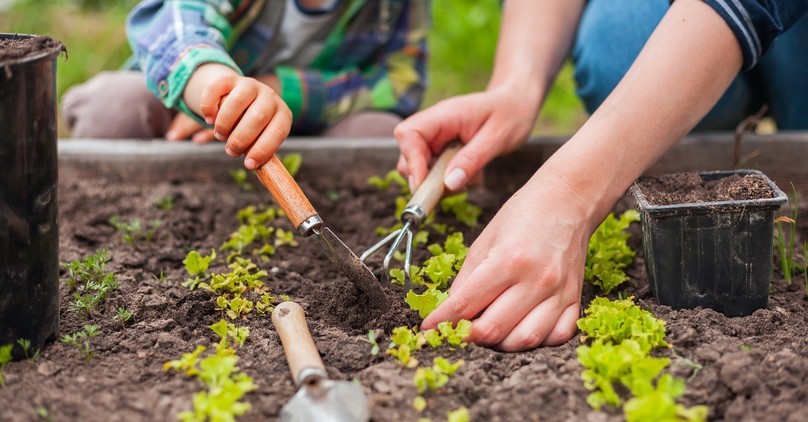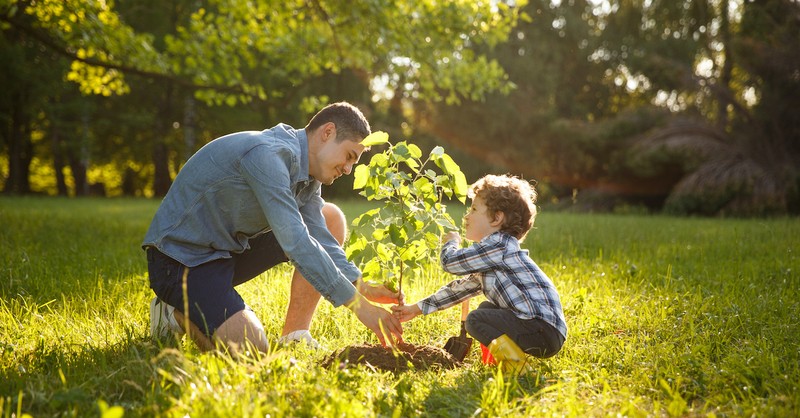
People have various ways to use their creative abilities. Some people sing, and others draw, paint, or work with their hands. Some people have green thumbs and can create beautiful gardens full of delicious fruits and vegetables or beautiful flowers they can enjoy throughout spring. But gardening is not so pleasant for those of us who seem to kill everything we touch.
If you are someone who tries their best to garden yet can't seem to find the knack, here are seven gardening tips for you to still enjoy the beauty of gardening and enjoy the result:
Photo Credit: ©iStock/Getty Images Plus/perfectlab
1. Weed Often
When my husband and I first got married, we moved to a rural area of Canada. The place where we lived had a very large plot of land already tilled for gardening. Thinking this would be a great hobby, we borrowed someone’s seeder and seeded the large tract of land. We went on a vacation for two weeks, and when we returned, we were shocked to find the entire area covered in weeds! Catching up on weeding took the fun out of the gardening process for us. Additionally, the vegetables and fruit we yielded were way too much for us to eat. We wound up losing half of the crop simply because we had too much of it.
One of the areas that can get out of control in gardening is the weeds. Be sure to take one or two evenings a week and pull all the weeds, even the ones that are just beginning. Keeping the area as clean and weed-free as possible will make your gardening experience much more enjoyable.
2. Outsource When Necessary
If you find you're not good at gardening or don't feel like you can maintain it, enlist the help of college students or high school students that are looking to make an extra dollar. Are there teens within their church looking to raise money for a church event or just want to save up for a particular item? Hire them to do your gardening for you. Ask them to weed the area. Not only will it be a good experience for them, but you will also be able to yield the crop that you seeded. And who knows? Perhaps the teenagers might teach you a trick or two!

3. Do a Little at a Time
It's easy to get overwhelmed by a large area of land. Take it slow and small and start your gardening process with just a little area. It will be easier for you to care for and keep manageable. If you find you would like more, feel free to expand it in the coming years. Make it a priority to maintain the area a couple of times a week or a couple of Saturdays a month so it doesn't get out of control.
4. Let It Be Therapy
Gardening, like drawing or creating, can be a great creative outlet to unwind after a long day of work. Planting flowers and watching them sprout up and brighten your spirits is a natural way to give your soul the care it needs. Having busy work to do with your hands while your mind processes events from your day (or even past hurtful events), not only gives you something constructive to do with your time but is also a great way to get away from the screen and commune with nature.
Furthermore, planting vegetables and fruit is a quick way to receive a natural source of many of the vitamins and minerals the modern diet tends to lack. It is a delight to cut up a fresh cucumber or tomato and allow the natural flavors to burst in your mouth. It is a joy for you to enjoy the (literal) fruits of your labor. Not only is it cost-effective and healthy for the whole family, but the vitamin D from the sun is a great way to supplement nutrients in your body where you may be deficient.
Photo Credit: ©Getty Images/Povozniuk
5. Worship the Lord
Not only is it a great way to cut down on grocery costs and enjoy your favorite fruits and vegetables that taste better from your garden than they do in the store, but it is also a great way to worship the Lord. God's hand is evident all throughout creation. Planting a tiny seed and watching it bloom into a beautiful flower or sun-ripened tomato in just a few weeks is truly a miracle. Enjoying the miraculous work of God, even in something as tiny as a vegetable seed or small as a beginner's flower bed, will only reinforce the privilege it is to worship the Lord. It will also reinforce your belief in an ever-loving God who is constantly creating things for his people to enjoy. And what God creates is for mankind's provision, offering sustenance to give everyone the necessary energy to last them throughout their day.
Take this one step further and use headphones or earbuds or listen to your favorite worship music or relaxation CD. This will help you relax after a long day and keep your heart and attitude focused on the right things. As you listen to the worship music, remember who created these things. That allows us to do the work of tending to his creation. But he also gives gifts congruent with how he has wired us. Not everyone is good at gardening. If you find you are not one of them, skip the tedious work of weeding and watering and enjoy a cup of hot coffee on your deck instead.

6. Do Only What's Needed
In planning a garden, it may be tempting to do all different types of flowers and plants. But it is best to do only what you can. For example, do you have to plant every vegetable that is available? Limit your selections so you can manage your garden much more effectively. This will make it feel less overwhelming, and if the plants or vegetables never grow, it will be easy to seed the area with grass if you choose to get rid of it. Try only tomatoes and cucumbers this year, and experiment with different types of plants next year if you find it goes well. And don't be afraid to ask fellow gardeners or plant store workers which vegetables, fruits, and flowers are easy to maintain for beginners.
7. Give Yourself Time to Learn
As with anything, gardening takes practice. It may take a few years before you actually get the right amount of water and sunlight. It will also take time to figure out how much time you need to maintain the garden. Give yourself a break. If the garden is not working out the way you would hope, don't get down on yourself. You have many wonderful qualities. Gardening does not have to be one of them. If, after a couple of years, you find that gardening is not working out for you, find another hobby so you can still have a creative outlet and enjoy what God has created without getting too frustrated.
Gardening, like anything else, takes skill. Some people have the gift of gardening and have a green thumb, while others have a black thumb, and nothing seems to grow. Don't get down on yourself if it doesn't work out the way you would like. Remember, gardening is merely a hobby, and anything that you grow in the garden can easily be bought in a store. Try your best, give yourself time to learn, and you may find after some practice you have a beautiful garden that you can enjoy.
Photo Credit: ©GettyImages/max-kegfire
Originally published Tuesday, 14 March 2023.




